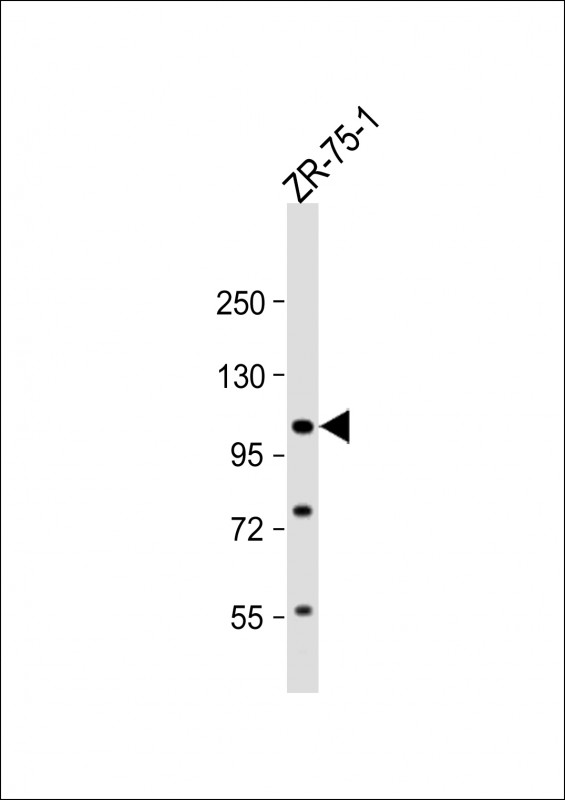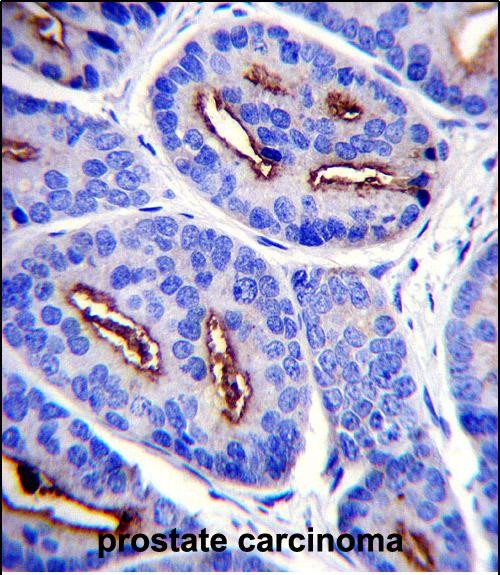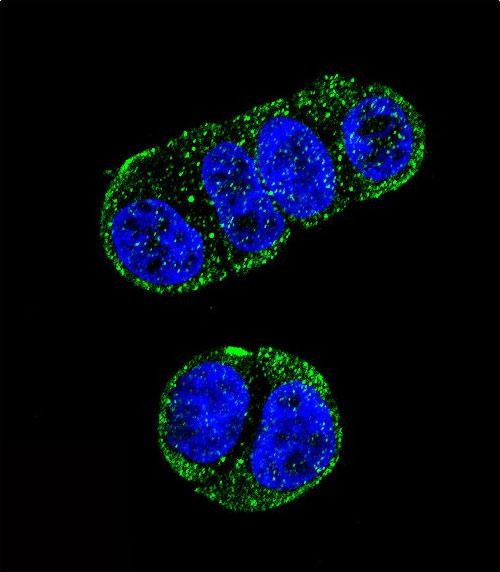FOLH1 Antibody (N-term)
Affinity Purified Rabbit Polyclonal Antibody (Pab)
- 产品详情
- 实验流程
- 背景知识
Application
| IHC-P, IF, WB, E |
|---|---|
| Primary Accession | Q04609 |
| Other Accession | Q9CZR2, Q9Y3Q0, P70627, O77564, O35409, NP_001180400.1, NP_001014986.1 |
| Reactivity | Human |
| Predicted | Mouse, Pig, Rat |
| Host | Rabbit |
| Clonality | Polyclonal |
| Isotype | Rabbit IgG |
| Calculated MW | 84331 Da |
| Antigen Region | 161-190 aa |
| Gene ID | 2346 |
|---|---|
| Other Names | Glutamate carboxypeptidase 2, Cell growth-inhibiting gene 27 protein, Folate hydrolase 1, Folylpoly-gamma-glutamate carboxypeptidase, FGCP, Glutamate carboxypeptidase II, GCPII, Membrane glutamate carboxypeptidase, mGCP, N-acetylated-alpha-linked acidic dipeptidase I, NAALADase I, Prostate-specific membrane antigen, PSM, PSMA, Pteroylpoly-gamma-glutamate carboxypeptidase, FOLH1, FOLH, NAALAD1, PSM, PSMA |
| Target/Specificity | This FOLH1 antibody is generated from rabbits immunized with a KLH conjugated synthetic peptide between 161-190 amino acids from the N-terminal region of human FOLH1. |
| Dilution | IHC-P~~1:100~500 IF~~1:10~50 WB~~1:1000 E~~Use at an assay dependent concentration. |
| Format | Purified polyclonal antibody supplied in PBS with 0.09% (W/V) sodium azide. This antibody is purified through a protein A column, followed by peptide affinity purification. |
| Storage | Maintain refrigerated at 2-8°C for up to 2 weeks. For long term storage store at -20°C in small aliquots to prevent freeze-thaw cycles. |
| Precautions | FOLH1 Antibody (N-term) is for research use only and not for use in diagnostic or therapeutic procedures. |
| Name | FOLH1 (HGNC:3788) |
|---|---|
| Synonyms | FOLH, NAALAD1, PSM, PSMA |
| Function | Has both folate hydrolase and N-acetylated-alpha-linked- acidic dipeptidase (NAALADase) activity. Has a preference for tri- alpha-glutamate peptides. In the intestine, required for the uptake of folate. In the brain, modulates excitatory neurotransmission through the hydrolysis of the neuropeptide, N-aceylaspartylglutamate (NAAG), thereby releasing glutamate. Involved in prostate tumor progression. |
| Cellular Location | Cell membrane; Single-pass type II membrane protein |
| Tissue Location | Highly expressed in prostate epithelium. Detected in urinary bladder, kidney, testis, ovary, fallopian tube, breast, adrenal gland, liver, esophagus, stomach, small intestine, colon and brain (at protein level). Detected in the small intestine, brain, kidney, liver, spleen, colon, trachea, spinal cord and the capillary endothelium of a variety of tumors. Expressed specifically in jejunum brush border membranes. In the brain, highly expressed in the ventral striatum and brain stem. Also expressed in fetal liver and kidney Isoform PSMA' is the most abundant form in normal prostate. Isoform PSMA-1 is the most abundant form in primary prostate tumors. Isoform PSMA-9 is specifically expressed in prostate cancer |
For Research Use Only. Not For Use In Diagnostic Procedures.
Provided below are standard protocols that you may find useful for product applications.
BACKGROUND
This gene encodes a type II transmembrane glycoprotein belonging to the M28 peptidase family. The protein acts as a glutamate carboxypeptidase on different alternative substrates, including the nutrient folate and the neuropeptide N-acetyl-l-aspartyl-l-glutamate and is expressed in a number of tissues such as prostate, central and peripheral nervous system and kidney. A mutation in this gene may be associated with impaired intestinal absorption of dietary folates, resulting in low blood folate levels and consequent hyperhomocysteinemia. Expression of this protein in the brain may be involved in a number of pathological conditions associated with glutamate excitotoxicity. In the prostate the protein is up-regulated in cancerous cells and is used as an effective diagnostic and prognostic indicator of prostate cancer. This gene likely arose from a duplication event of a nearby chromosomal region. Alternative splicing gives rise to multiple transcript variants encoding several different isoforms.
REFERENCES
Bailey, S.D., et al. Diabetes Care 33(10):2250-2253(2010)
Giusti, B., et al. Thromb. Haemost. 104(2):231-242(2010)
Jugessur, A., et al. PLoS ONE 5 (7), E11493 (2010) :
Mlcochova, P., et al. Prostate 69(5):471-479(2009)
Davis, M.I., et al. Proc. Natl. Acad. Sci. U.S.A. 102(17):5981-5986(2005)
终于等到您。ABCEPTA(百远生物)抗体产品。
点击下方“我要评价 ”按钮提交您的反馈信息,您的反馈和评价是我们最宝贵的财富之一,
我们将在1-3个工作日内处理您的反馈信息。
如有疑问,联系:0512-88856768 tech-china@abcepta.com.























 癌症的基本特征包括细胞增殖、血管生成、迁移、凋亡逃避机制和细胞永生等。找到癌症发生过程中这些通路的关键标记物和对应的抗体用于检测至关重要。
癌症的基本特征包括细胞增殖、血管生成、迁移、凋亡逃避机制和细胞永生等。找到癌症发生过程中这些通路的关键标记物和对应的抗体用于检测至关重要。 为您推荐一个泛素化位点预测神器——泛素化分析工具,可以为您的蛋白的泛素化位点作出预测和评分。
为您推荐一个泛素化位点预测神器——泛素化分析工具,可以为您的蛋白的泛素化位点作出预测和评分。 细胞自噬受体图形绘图工具为你的蛋白的细胞受体结合位点作出预测和评分,识别结合到自噬通路中的蛋白是非常重要的,便于让我们理解自噬在正常生理、病理过程中的作用,如发育、细胞分化、神经退化性疾病、压力条件下、感染和癌症。
细胞自噬受体图形绘图工具为你的蛋白的细胞受体结合位点作出预测和评分,识别结合到自噬通路中的蛋白是非常重要的,便于让我们理解自噬在正常生理、病理过程中的作用,如发育、细胞分化、神经退化性疾病、压力条件下、感染和癌症。








